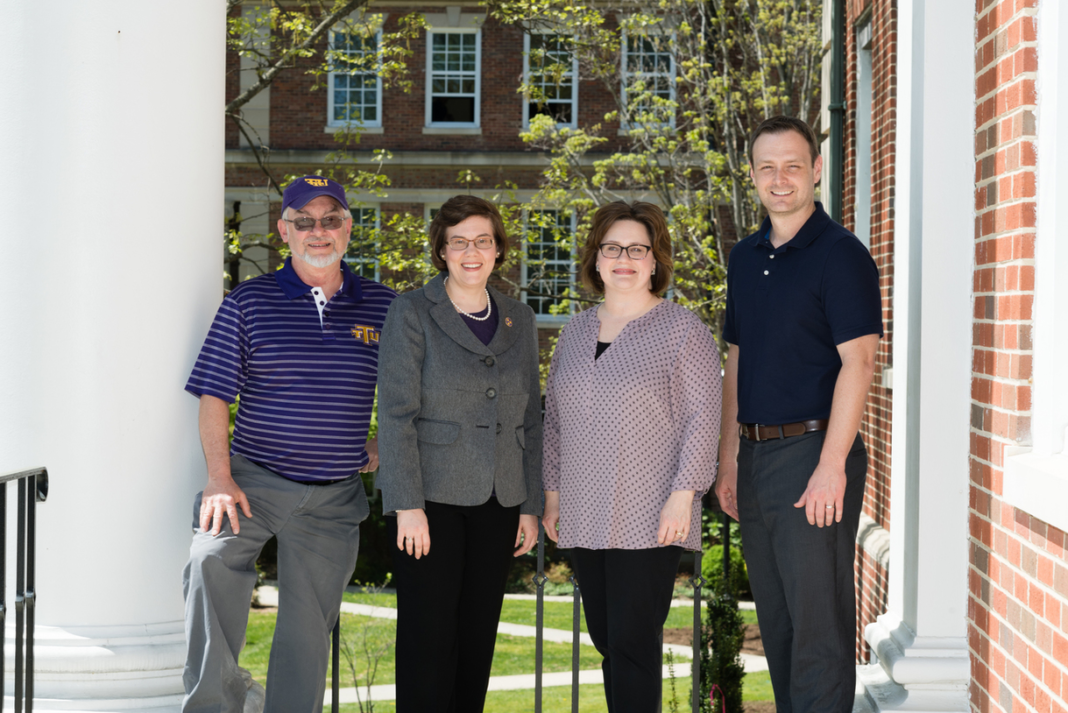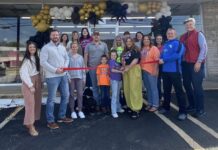
COOKEVILLE – Excitement, humility and determination drive the strategic planning that’s taking place to shape the Tennessee Tech of tomorrow that students will experience.
Those dynamic descriptions aren’t often associated with strategic planning, but Tennessee Tech faculty leaders are making sure this is no ordinary process.
Charged by President Phil Oldham to create a shared and impactful vision for the university, four faculty members are leading students, alumni, faculty, staff, board members, and external constituents through a process to shape the future of Tennessee Tech.
“I have been a faculty member for 30 years, and this is the first time that the faculty have been involved in implementing a strategic plan at such a deep and meaningful level,” said chemistry professor Ed Lisic. “Strategic plans in the past have been big ideas that have been more top-down affairs, and whereas faculty have input in certain areas, the implementation is through administrative channels.”
Oldham says the timing is perfect, and the work is taking advantage of the university and community strengths.
“We stand in an ideal position to educate our students on the social, economic, and historical impact of technologies such as genomics, robotics, codification of money and markets, cybersecurity, big data, and autonomous transportation. This sets Tennessee Tech apart from most other universities,” said Oldham. “We must plan to take advantage of our position. That’s why this Strategic Planning Process is so important. It’s designed to capture the energy, information and innovation from our campus community and to share clear strategic direction across campus.”
In Fall 2018, the plan entered its implementation phase. This phase involves four separate but intricately linked committees of faculty and staff members, led by four working group chairs that have, as their focus, large goals that include several important priority actions. These strategic goals and chairs are: Ed Lisic, Education for Life; Jason Beach, Innovation in All We Do; Ann Davis, Exceptional Stewardship; and, Bedelia Russell, Engagement for Impact.
“Because these four strategic goals have as many as five priority actions each, these goals are not only sweeping across all areas of campus, but require detailed focus by the committees on many topics,” said Lisic. “This is a daunting task, but with hard work we believe are making a difference.”
The Tech Tomorrow work groups have developed 25 proposals that address priority actions across each of the plan’s four goals. One of the first items Lisic’s group tackled was to propose a Grand Challenge, an effort with ambitious but achievable goals that harness the capabilities of a campus while inspiring imaginations. Rural Reimagined has been created to focus on developing and supporting success throughout rural areas in Tennessee that can be replicated to help rural areas throughout the country and the world.
“This Grand Challenge has already begun to change things here at Tech,” said Lisic. “A focus such as the Rural Reimagined Grand Challenge for our efforts to help others is a powerful force that gives the campus an overall strategy of engagement with community, and makes the faculty and students at Tech more relevant and important in society and a definite force for positive change.”
Beach, an associate professor in curriculum and instruction, is also looking for positive change as his Innovation in All We Do Workgroup focuses on developing and implementing technologically infused programs.
“Because our working groups are diversified, perspectives from across campus are included in strategic planning implementation,” said Beach. “This approach allows the working groups to see the strengths of the university and how to continue to build on the foundational qualities that define Tennessee Tech.”
Beach’s group is working on a SWOT analysis which is a common planning technique used in corporations that examine an organization’s strengths, weaknesses, opportunities and threats. The group has developed a SWOT analysis workbook that is aligned with Tech’s core principles.
The group has also developed an innovation inventory to document innovations from each college on campus. This inventory gives a better understanding of Tech’s strengths, as well as share the best practices across colleges.
“The work and planning that goes into the strategic plan is rooted in the principle of providing our students with fundamental skills needed for a technological workforce,” Beach explained. “Our students across all disciplines are known for their innovative courage and passion to get the job done. As technology changes the workforce landscape, so does Tennessee Tech in how we educate, inspire, and impact our students’ ability to shape the future.”
The Exceptional Stewardship Workgroup led by Ann Davis, an associate professor in accounting, has already started to shape the efficiency and effectiveness of operational/administrative processes and procedures on campus.
“A significant amount of time has been spent on data gathering to ensure recommendations are driven by data,” said Davis. “By our recommendations coming from individuals dealing with these issues on a daily basis and through discussions and extensive research, I feel like the strategic plan has the ability to impact the campus as a whole and to positively impact the daily lives of faculty, staff and students.”
The group has focused on improving the graduation process for undergraduate students, prioritizing substitutions for graduating seniors, improving communication regarding graduation, utilizing DegreeWorks more effectively, and strengthening the advisement model for undergraduate students.
Their efforts have also been focused on improving the communication. Plus, the group also sees a need to improve communication with and orientation of online and non-traditional students by improving the online training portal to include online and non-traditional students.
“While our students are at Tennessee Tech to gain knowledge and receive an education, it is my hope that we are also graduating career-ready individuals that are excited about entering their profession and confident in tackling challenges they will face,” said Davis. “Our strategic plan provides opportunities to create new programs, provide experiential learning, streamline processes, and inspire community involvement.”
Those same sentiments can be echoed by Bedelia Russell, an associate professor in nursing instruction, as the Engagement for Impact Workgroup vies to modernize, adapt, and create academic programs, continuing education certificates and training activities responsive to impactful engagement.
“Transformation takes time but I believe the transformation has already begun,” Russell said. “We are seeing diverse groups come together to propose some really innovative ideas. Many of the ideas will break down the silos of academic and administrative areas to promote cooperative change in the culture of the university.”
Russell’s group is near completion of a peer gap analysis of academic program offerings in addition to the recent proposal of the Center for Advancement of Faculty Excellence. The group is also addressing ways the university partners with each other internally as a Tech community as well as externally with communities of interest.
“We want to be sure we are engaged in activities and partnerships which create the most impact, are scalable and relevant,” Russell said. “To date, we have created a partnership inventory and aggregated employment data to identify gaps in both areas for the university and the colleges and schools.”
“The work groups are a broad cross-section of representation including faculty, staff, administrators and community leaders. Together, we are working collaboratively to identify potential ideas or solutions to address action items and tactics in the strategic plan,” continued Russell. “As we move through this process, we have gained insights from each other’s perspectives and realized our own perspective about a particular issue may be limited.”
The ultimate goal of all the work groups is to give the students the best experience and education possible.
“There is no substitute for experience,” said Lisic. “Through experiences such as undergraduate research, service learning, study abroad, intensive writing, creative activities such as in art production, making music, and writing new material, or making innovative tools or materials in manufacturing and mechanical engineering, students can leverage their experiences here at Tech to increase their value to society and make a happy, powerful and engaged life for themselves.”
For more information on Tech Tomorrow, go to https://www.tntech.edu/strategic/.







